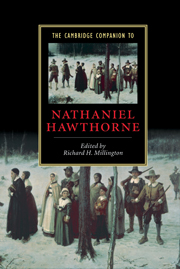Book contents
- Frontmatter
- Introduction
- 1 Hawthorne’s Labors In Concord
- 2 Hawthorne as cultural theorist
- 3 Hawthorne and American masculinity
- 4 Hawthorne and the question of women
- 5 Hawthorne, modernity, and the literary sketch
- 6 Hawthorne’s American history
- 7 Hawthorne and the writing of childhood
- 8 Love and politics, sympathy and justice in The Scarlet Letter
- 9 The marvelous queer interiors of The House of the Seven Gables
- 10 Sympathy and reform in The Blithedale Romance
- 11 Perplexity, sympathy, and the question of the human: a reading of The Marble Faun
- 12 Whose Hawthorne?
- Selected bibliography
- Index
- Series list
12 - Whose Hawthorne?
Published online by Cambridge University Press: 28 May 2006
- Frontmatter
- Introduction
- 1 Hawthorne’s Labors In Concord
- 2 Hawthorne as cultural theorist
- 3 Hawthorne and American masculinity
- 4 Hawthorne and the question of women
- 5 Hawthorne, modernity, and the literary sketch
- 6 Hawthorne’s American history
- 7 Hawthorne and the writing of childhood
- 8 Love and politics, sympathy and justice in The Scarlet Letter
- 9 The marvelous queer interiors of The House of the Seven Gables
- 10 Sympathy and reform in The Blithedale Romance
- 11 Perplexity, sympathy, and the question of the human: a reading of The Marble Faun
- 12 Whose Hawthorne?
- Selected bibliography
- Index
- Series list
Summary
“Our” Hawthorne
As the afterword to the Hawthorne Centenary volume of essays, Lionel Trilling contributed “Our Hawthorne,” an essay he later republished as “Hawthorne in Our Time.” Although Hawthorne specialists have never been particularly enamored of it, the essay is one of the most important studies of the author during the 1960s, not because it introduces any new scholarship or because it offers some methodological advance. Instead, its interest lies in the way it crystallizes a way of thinking about Hawthorne, his importance to US society as well as to academic values. Trilling's second title may have improved over the first, since it minimizes the issue of ownership and insists, however gently, on the historicity of reception. The first title, however, resonates aptly, evoking as it does how much a generation's reading of Hawthorne, or, indeed, any classic author, lays claim to possession, i.e., the owning of critical rights. “Our” moment, for Trilling, was the post-war era of New Critical predominance, the generation whose Hawthorne has given us the one that the post-1980s generations have needed to overturn or recast.
This sense of critical proprietorship is usually disclosed in scholarly skirmishes through questions of propriety – the protocols of interpretation. Generally claims of possession are made by individuals or by societies, perhaps keepers of the flame who may be outraged by some new revisionist. Trilling’s title reminds us that possession is more nuanced and that a generation, even a whole literary culture, can have a great deal invested in seeing an author in a particular light, perhaps in the way that the post-World War II generation had so much invested in Ernest Hemingway, a veteran of World War I, whose example filled a romantic need to exalt the author as both virile and sensitive.
- Type
- Chapter
- Information
- The Cambridge Companion to Nathaniel Hawthorne , pp. 251 - 265Publisher: Cambridge University PressPrint publication year: 2004
- 2
- Cited by



